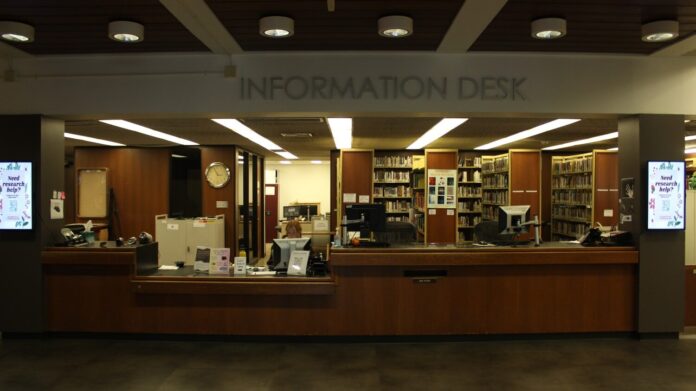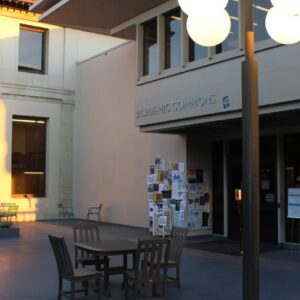
Occidental’s Senior Director of Collections, Systems and Services Brian Chambers announced the college’s new membership with HathiTrust in a campus-wide email Oct. 27. The email stated that the HathiTrust Digital Library Collection is the largest library collection managed by the academic and library community, and detailed some of the benefits students and faculty will receive as a result of Occidental’s membership. Students will have access to all public domain and open-access titles, access to copyright titles during emergencies and citation and data mining tools, according to the email. The email also included a research guide on how to use the site.
According to the HathiTrust website, the organization was founded in 2008 during the early days of mass print digitization through the Google Books Project. 12 universities in the Committee on Institutional Cooperation (now the Big Ten Academic Alliance) and the University of California established a partnership to preserve their digitized collections. With over 18 million digitized items, HathiTrust is the largest not-for-profit digital library.

HathiTrust representative Melissa Stewart said the organization’s mission is to contribute to research, scholarship and the common good through digitizing print works.
“Our mission is primarily preservation with the greatest amount of access that we can legally provide to our materials,” Stewart said.
Membership is available to libraries that are part of higher education academic institutions, according to Stewart. Libraries with a clear mission, like the Library of Congress or the Getty Research Institute, can also join, Stewart said.
“We are by libraries, for libraries,” Stewart said.
According to Occidental’s Librarian Kevin Mulroy, the project to join HathiTrust began in 2019, when he came to Occidental. Mulroy previously worked at the Claremont Colleges, where he helped them join HathiTrust as well.
“We’re [Occidental College] a member of the Oberlin Group of Libraries — liberal arts colleges across the country — and a number of them have become members of HathiTrust, to a really good effect,” Mulroy said. “It really helps faculty and students by increasing the amount of scholarly information resources available, but also a lot of research services as well.”
Once the process for membership began, the college had to submit a list of all of its print holdings within the general and special collections for review, according to Chambers.
“I put together a list of numbers for them to match on what they have in their collection,” Chambers said. “They come back with ‘Great, thank you for sharing this, we’ve taken a look at what you have and we’ve set your membership fees at x amount.’ And then at that point, it’s up to us to say, ‘Yes, we commit to membership.’”
From there, HathiTrust worked with the college to set up authentication, which allows members to sign in with their institutional accounts. Anyone can create a free account with HathiTrust, but Stewart said they charge a membership fee in order to provide special services to the institutions they work with.
Members have access to a number of unique services not available to anyone else, including the ability to download full PDFs of public domain and open access titles, full collection access for those who are print disabled and access to copyrighted titles during library emergencies.
“It’s this massive body of works, many of which are in the public domain, but they’re all in one place and accessible to [students],” Chambers said.
Mulroy said that a music student used HathiTrust for sourcing, illustrating the potential the site has for advancing undergraduate research.
“The student found the Liszt manuscripts, an unknown manuscript by Franz Liszt that we have in our special collections. They wanted to look at anything that looked similar to the manuscript that had been published, and the only thing we could find was in HathiTrust,” Mulroy said.
Erin Sulla, the Arts and Humanities Librarian and the creator of the HathiTrust research guide, said she worked extensively with the site during her time at the University of Illinois Library. Sulla said that the site opens up a lot of potential for classroom use.
“If professors are interested in assigning things [like] historical documents, or primary sources, or digitized textbooks, they can think about using that platform to reduce some of the costs and burdens for students and for themselves as well,” Sulla said.
HathiTrust also allows users to create specialized collections of different texts, and use their text and data mining services to search within texts. Stewart said that different classes and individuals have been able to use these tools for curation and research purposes.
“There’s this banned books collection by a Texas A&M University text mining class. [It was] a class that made their own collection of banned books,” Stewart said.
According to Sulla, the library plans to promote the usage of HathiTrust by working directly with students and faculty through classes, library sessions and collaborating with student groups. Recently, the library collaborated with Project SAFE to create a display case in honor of Domestic Violence Awareness Month.
“Students were able to reach out and say ‘Hey, we want these books for the library, and we want you to put them up and say that we selected them,’” Sulla said. “If you’re interested in cultivating resources for the library, or wanting to know more to promote to your members, this is something we can do as well.”
Chambers and Mulroy said that joining HathiTrust is a huge step forward in what the library can provide and offers reassurance that in case of a major event, the community will not be left stranded.
“The keyword is trust, and trust is going to be there,” Mulroy said.
Contact Wura Ogunnaike at ogunnaike@oxy.edu
![]()






























